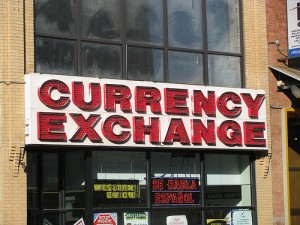 Savings can be held in any currency. Of course, other currencies are currently much more difficult to exchange in the US, but if you’ve visited other countries, you’ve probably noticed that currencies other than the national currency are often accepted in many countries. We’ve noticed over just the last decade that Dollars used to be the preferred currency for vendors to accept in the countries we’ve visited, but that over the last few years, Euros British Pounds have been much more desirable. Perhaps in the case of higher inflation, more foreign currencies will be accepted in this country.
Savings can be held in any currency. Of course, other currencies are currently much more difficult to exchange in the US, but if you’ve visited other countries, you’ve probably noticed that currencies other than the national currency are often accepted in many countries. We’ve noticed over just the last decade that Dollars used to be the preferred currency for vendors to accept in the countries we’ve visited, but that over the last few years, Euros British Pounds have been much more desirable. Perhaps in the case of higher inflation, more foreign currencies will be accepted in this country.
This doesn’t really matter for our discussion of holding savings in foreign currencies, but thinking about this might give you a better feel for the value held within a fiat currency.
In general, currencies are more stable than most other markets. Because they represent an entire country, the currencies of larger countries do not typically move too dramatically against each other. So as long as you’ve chosen a solid country to hold savings in, it will probably move much more slowly than any investment that you make, while still giving some protection against a crash of the Dollar.
There are about as many currencies as there are countries and there is a vast difference in the solidity and dependability of each. Given our previous discussions of the impending fall of the Dollar, we would consider some to be safer than the Dollar, but some to be more dangerous. Moving wealth out of dollars and into British Pounds or Japanese Yen would not make any sense to us currently. These countries are doing the exact same things as the United States is currently doing with its currency. Many other countries are also printing and borrowing money with reckless abandon. Often this is done in order to purposefully bring the value of that currency down so that that country can still sell affordable goods to the US.
These countries are not safe places to hold your savings!
It would be ideal if there were a country which still backed its currency with real assets like most all of them used to do. If the Dollar crashes as we believe it will, and the whole world’s Dollar Reserve Currency system is being reformed into a new system, there will probably be a country (or more) who go back to a “real” currency by backing it with gold or something else tangible. Perhaps Hong Kong or some similar country.
In the meantime, if you are to consider moving savings into another currency, you must look into at least two important factors:
- How prudent are they in printing and borrowing money?
- How stable is that country’s economy, what is it based on, and how is it likely to hold up going forward?
The first question asks, “Is this country going to devalue its currency in the same way that the US is purposefully devaluing the Dollars which I already hold?” If it is, you wouldn’t want to hold that currency. If the country is prudent about maintaining the value of the currency (both in what they say, and in what they do), then you should ask the second set of questions.
If the country is likely to fall apart when a storm strikes, then they might decide to turn to fast money policies which hurt the value you had entrusted to them, so you want to have an idea of what the likelihood of this is. Is the economy strong? If so, what is it based on? Does it have it’s own strength or does it rely on exporting goods to the US? If it relies on the US to buy its goods and the US can’t afford to buy them anymore, how will they fare?
We suggest looking for countries that have a large natural resource base to its economy. Because they will have more real assets than most, they will probably hold up better than countries which rely on cheap labor or tourism which might both dry up.
Another thing you’ll be looking for is the level of interest that a country pays. You might be swayed to keep money with a country if they pay you more to keep it there. Of course, often countries pay higher interest because they see higher inflation so the first question above could rule most of these out of the equation.
The last thing we’ll say about foreign countries is that it is still legal to own foreign bank accounts and land. However, this legality is being chipped away at all the time and historically almost all governments begin removing its citizens’ rights of this type after its policies have begun failing, just as our government has done in the past. If you have more than a million dollars (to pick a totally arbitrary number) or are simply really interested in this type of diversification, this might be a conversation we should have, but we aren’t going to write anymore about that here.
This post is Part 9 in the series A Few Ways to Prepare. To use this as a growth tool to better understand your own calling, you might start by reading Pt 1, Pt 2, Pt 3, Pt 4, Pt 5, Pt 6, Pt 7 and Pt 8.
Photo credit: The Truth About
